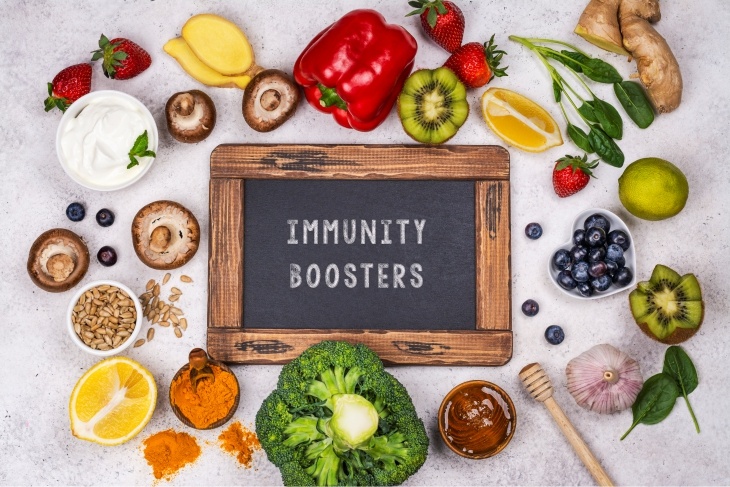

By Stephanie Simons,
Head Pharmacist,
Lindo’s Pharmacy in Devonshire
It’s that time of year again, when everyone’s blowing their nose or got a tickle in their throat. Just as the dreaded pandemic is starting to ease, bugs like the common cold are back with a vengeance. Luckily, we have our immune systems to help us weather the storm. But what is the immune system? And how can we best support it?
What is the immune system?
The immune system is our body’s complex network of organs, cells and chemicals that work together to try to keep out germs and fight the ones that do get in.
It is made of two types of system that work together to keep you healthy: the innate immune system which we are born with, and the adaptive immune system develops as and when you are exposed to germs. The main parts of the immune system include white blood cells, antibodies, the lymphatic system and the bone marrow.
How does it work?
As we go about our lives, our bodies come into contact with all sorts of bacteria, viruses, fungi and parasites. These can enter the body through our skin, by breathing in liquid droplets from others’ sneezes or coughs, sexual intercourse, blood from a needle or insect, or ingesting contaminated food and water.
The immune system senses the invading microbes and immediately responds by releasing special cells which travel towards the danger and attack it. Once the microbe is defeated, your system will memorise it using special types of white blood cells (B- and T-lymphocytes) so that it can recognise and destroy the microbes quickly should they ever return. This is why you often bounce back easily from viruses you’ve already had, like chicken pox.
Other parts of the immune system act preventatively. Mucus in your nasal passages and digestive system contains enzymes ready to fight and kill unwanted bacteria should it occur. Similarly, the lymphatic system is made up of fine tubes which collect fluid called lymph from tissues that picks up and filters out waste and germs.

How can we take care of it?
A highly complex system, your immune response requires balance and harmony to function at its best. As with all elements of your body, it works most effectively when supported by a healthy lifestyle.
A varied diet rich in fruit and vegetables is key. Citrus fruits and bell peppers are rich in Vitamin C, which builds your immune system by increasing your production of white blood cells. Crammed with vitamins A, C, and E alongside a wealth of minerals and antioxidants, broccoli is also a great addition to your plate, while garlic and ginger have been used since ancient times to help fight infection.
On the other hand, bad habits like smoking can significantly harm your immune system, making you far more susceptible to infections like pneumonia and flu. Stress can also weaken your immune response, as the stress hormone corticosteroid lowers the number of white blood cells ready to fight foreign bodies.
How can your pharmacy help?
As temperatures drop and we spend more time indoors, you might find yourself battling the bugs – but that is where we can help.
For colds and flu symptoms, try Otrivine, Vicks First Defence, XClear or Afrin to ease congestion and Chloraseptic Spray or lozenges and Strepsils are great for a sore throat. If your little ones are suffering, Hyland’s or Zarbee’s syrups will help them return to their lively selves,
If you’re worried your diet might not providing the nutrients your immune system needs, try a multi-vitamin like Centrum, Smarty Pants or Olly products and speak to your pharmacist about quick and easy ways to boost your diet. We can also advise on smoking cessation products like Nicorette or Nicotinell available as gum, lozenges, patches, or spray – you won’t believe how quickly your bodily functions improve once rid of the harmful effects of cigarettes.
Your GP and pharmacist are here to help all year round, so if you’re concerned about your health, do come to see us.
Stephanie Simons is the head pharmacist at Lindo’s Pharmacy in Devonshire. She earned her Bachelor of Science in Pharmacy at Massachusetts College of Pharmacy and has been practicing for over 20 years. She is a registered pharmacist with the Bermuda Pharmacy Council and is a member of the Bermuda Pharmaceutical Association.


